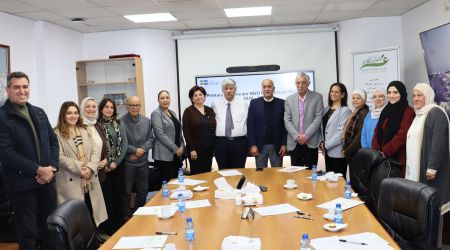On March 3 and 4, the NGO Development Center (NDC) held a two-day rapid needs assessment workshop for 47 Palestinian NGOs working in the sectors of Health and rehabilitation, Agriculture, Social Services and Education at the Roots Restaurant in Gaza City. It is important to note that this was the first needs assessment for and by local Palestinian NGOs since the Israeli offensive which began on December 27, 2008. The mechanism applied focused on sector working groups and included the following points of discussion: role of NGOs in service delivery, preparedness of NGOs in the current situation, capacity and capability of NGOs to absorb additional funding and to implement additional programs, the need of each sector by priority, immediate and intermediate interventions with an emphasis on quick start, and the possibilities of cooperation and coordination.
The preliminary findings of the rapid needs assessment indicated that Palestinian NGOs in Gaza face new and additional challenges as a result of Israel"s 22 day military offensive which began on December 27, 2008. The vast majority of NGOs indicated the unstable political situation, Israeli occupation and its manifestations, continues to be the main detriment to their work. NGO participants stressed the need for continued advocacy initiatives on various tracks to end the Israeli occupation. NGOs also stressed the need for unity among Palestinian parties, coordination of efforts among all actors and the importance of finding exit strategies and working in the context of both immediate needs and long term development.
The workshops’ findings were based on each sector’s immediate and long term needs, as well as priorities. It was also noted that in addition to the immediate and long-term needs resulting from the latest Israeli actions, it was imperative to continue with the on-going projects and programs in place. The needs identified by the four sectors included the following:
The health and rehabilitation sector immediate needs included the rehabilitation of health centers and facilities, procuring medical supplies and diagnostic equipment, enhancing health centers’ capacities to receive emergency cases and improving intensive care units; the long-term needs focused on developing a comprehensive health plan inclusive of health and its sub sectors, developing the capacities of health care personnel in the areas of preparedness and specialization, equipping health centers and facilities and activation of policy-making by national institutions.
The agricultural sector immediate needs included the rehabilitation of irrigation networks, greenhouses, smallholder farms and agricultural wells, rehabilitation of destroyed agricultural land, productive agricultural assets, rebuilding and rehabilitation of livestock and poultry farms and fishing boats, in addition to establishing employment generation programs for farmers who lost their land and therefore their main source of income. While the long-term needs included the reconstruction of destroyed agricultural organizations, agricultural labs and information centers, in addition to developing agricultural training centers and establishing loan programs for agricultural investment.
The educational sector immediate needs evolved around covering school tuition and basic education essentials (text books, school bags, uniform, etc…) for all students, rebuilding and reconstructing destroyed and damaged schools, universities, and laboratories, in addition to implementing psycho-social programs for teachers, school administrators and students, and designing recreation/ extra-curricular activities for children. The long term needs included establishing support centers (after-school programs) for children and counseling programs, developing educational tools, education and illiteracy programs for adults, developing comprehensive and shared educational database and establishing a coordination body for education.
The Psycho-Social sector targeted three groups, namely, children, women and youth. The immediate needs focused on conducting psycho-social and counseling activities and programs for children, women and youth, in addition to professional therapeutic activities, rehabilitation and recreational activities for children and their families, awareness activities for women (on how to deal with children in times of crisis), establishing specialized halls and centers for women activities, and implementing training courses for youth in self-defense, emergency preparedness and crisis management. The long term needs included rehabilitation programs for children with special needs, establishing cultural centers for children, developing a comprehensive and shared database for psycho-social and counseling programs, establishing advocacy programs to change laws pertaining to women, family-oriented support programs, conducting training for mental health workers, developing a long-term crisis intervention plan, and documenting the Israeli violations against youth.
The NGO Development Center (NDC) is the largest Palestinian organization of its kind working hand-in-hand with Palestinian NGOs, local cooperatives, and community development organizations to improve the delivery of services to the disaffected and build a more capable, responsive Palestinian civil society. NDC programs and grants empower Palestinians to help Palestinians by providing NGOs the skills, tools and funds they require to address social needs and promote self-reliance amidst poverty. We advocate greater NGO transparency and accountability through the adoption of professional financial and management practices, and promote sector-wide coordination and sharing of best practice experiences.

